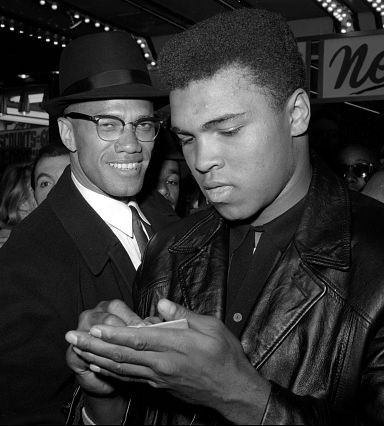Why Did Muhammad Ali Change His Name? This question delves into the intersection of identity, religion, and the fight against racial injustice. At WHY.EDU.VN, we provide comprehensive answers to your burning questions, exploring the historical context and personal motivations behind this pivotal moment. Delve into the champion’s transformation, his association with the Nation of Islam, and the rejection of his “slave name” for a new identity.
1. Unveiling the Motivation Behind Muhammad Ali’s Name Change
Muhammad Ali’s decision to change his name from Cassius Clay holds significant historical and personal weight. It’s a story interwoven with the Civil Rights Movement, the Nation of Islam, and a powerful statement against the legacy of slavery. Understanding the multifaceted reasons behind this transformation provides a deeper insight into Ali’s beliefs and his role as a cultural icon.
1.1. The Civil Rights Movement and the Rise of Black Nationalism
The 1960s was a period of intense social and political upheaval in the United States. The Civil Rights Movement gained momentum, challenging racial segregation and discrimination against African Americans. Simultaneously, Black Nationalism emerged as a powerful ideology, emphasizing self-determination, racial pride, and the creation of independent Black communities.
- Context: Segregation was legal in many parts of the US, limiting opportunities for Black Americans.
- Impact: The Civil Rights Movement fought for equal rights through nonviolent protests and legal challenges.
- Black Nationalism: Offered an alternative vision, advocating for Black empowerment and separation from white society.
1.2. The Nation of Islam and Identity Transformation
The Nation of Islam (NOI), a religious and political organization, played a pivotal role in Ali’s decision. The NOI advocated for Black empowerment, self-sufficiency, and a rejection of white American society, which they viewed as oppressive. A core tenet of the NOI was the rejection of “slave names” – surnames inherited from slave owners – and the adoption of new, often Islamic, names.
| Feature | Description |
|---|---|
| Core Beliefs | Black empowerment, self-sufficiency, rejection of white oppression |
| “Slave Names” | Surnames inherited from slave owners, seen as symbols of a painful past |
| Name Change Ritual | Members were encouraged to adopt new names, often Islamic, to reclaim their identity |
| Prominent Figures | Elijah Muhammad (leader), Malcolm X (influential spokesperson), Muhammad Ali (world-renowned athlete) |
| Impact on Identity | Provided a sense of belonging, pride, and connection to a shared heritage |
| Controversial Aspects | Separatist views, accusations of anti-white rhetoric, internal conflicts |
| Legacy | Contributed to the Black Power movement, influenced debates on race, identity, and social justice in America |


1.3. The Significance of Rejecting “Cassius Clay”
Ali viewed the name “Cassius Clay” as a symbol of his family’s history of slavery. Although he was named after his father, who was named after Cassius Marcellus Clay, a 19th-century abolitionist, Ali saw the name as inextricably linked to the institution of slavery. He wanted to shed this identity and embrace a new one that reflected his newfound faith and his commitment to Black liberation.
1.4. Embracing “Muhammad Ali”: A New Identity
After joining the Nation of Islam, Cassius Clay first became Cassius X, following the NOI’s practice of replacing surnames with “X” to signify the loss of ancestral heritage. He was later given the name Muhammad Ali by Elijah Muhammad, the leader of the NOI. This new name held deep religious significance, reflecting Ali’s conversion to Islam and his commitment to his faith.
- Cassius X: A temporary name, symbolizing the rejection of his “slave name.”
- Muhammad Ali: Given by Elijah Muhammad, signifying his new religious identity.
- Meaning: Muhammad, meaning “highly praised,” is the name of the Prophet of Islam. Ali means “highest, most eminent.”
- Significance: The name change was a public declaration of his faith and his allegiance to the NOI.
2. The Public Reaction and Controversy Surrounding the Name Change
Ali’s decision to change his name was met with mixed reactions. Many in the media and the public continued to refer to him as Cassius Clay, refusing to acknowledge his new identity. This refusal was often rooted in prejudice and a rejection of the NOI’s teachings.
2.1. Media Resistance and Misidentification
The media’s initial resistance to using Muhammad Ali’s new name highlights the racial biases prevalent during that era. Many journalists and commentators refused to acknowledge his chosen identity, continuing to call him Cassius Clay. This act was seen by Ali and his supporters as a deliberate attempt to undermine his authority and dismiss his religious beliefs.
| Aspect | Description |
|---|---|
| Initial Reaction | Widespread refusal to use the name Muhammad Ali |
| Underlying Reasons | Racial prejudice, rejection of the Nation of Islam, disbelief in his conversion |
| Media Portrayal | Often portrayed as arrogant, defiant, and ungrateful |
| Impact on Ali | Faced constant disrespect, had to repeatedly assert his identity |
| Shifting Attitudes | Over time, acceptance grew as Ali’s fame and influence increased |
| Legacy | Highlights the importance of respecting individual identity and the power of media representation in shaping public opinion |
2.2. The Government’s Response and Surveillance
Due to his association with the Nation of Islam, Ali became a target of government surveillance. The FBI closely monitored the NOI and its members, including Ali. This surveillance was part of a broader effort to suppress Black Nationalist movements and maintain social control.
2.3. The Impact on Ali’s Career and Public Image
The controversy surrounding his name change, coupled with his outspoken views on race and religion, had a significant impact on Ali’s career. He faced criticism, lost endorsements, and was even stripped of his heavyweight title for refusing to be drafted into the Vietnam War. However, his unwavering commitment to his beliefs ultimately solidified his legacy as a champion of social justice.
3. The Enduring Legacy of Muhammad Ali’s Transformation
Despite the challenges and controversies, Muhammad Ali’s decision to change his name remains a powerful symbol of self-determination, religious conviction, and resistance to racial injustice. His story continues to inspire people around the world to embrace their identities and fight for what they believe in.
3.1. Ali as a Symbol of Black Empowerment
Muhammad Ali’s life and career transcended the realm of sports. He became a symbol of Black empowerment, challenging racial norms and advocating for social justice. His unwavering stance against the Vietnam War and his outspoken criticism of racial inequality resonated with millions, solidifying his place as a cultural icon.
3.2. The Influence on Identity Politics and Social Activism
Ali’s transformation had a profound impact on identity politics and social activism. His story encouraged individuals to embrace their cultural heritage and challenge oppressive systems. He demonstrated the power of athletes and celebrities to use their platforms to advocate for social change.
3.3. The Continuing Relevance of Ali’s Message
In today’s world, where issues of race, identity, and social justice continue to be at the forefront of public discourse, Muhammad Ali’s message remains as relevant as ever. His legacy serves as a reminder of the importance of standing up for one’s beliefs, challenging injustice, and embracing one’s true identity.
4. Exploring the Personal and Spiritual Dimensions of the Name Change
Beyond the political and social implications, Muhammad Ali’s name change also reflected a deep personal and spiritual transformation. His conversion to Islam and his association with the Nation of Islam provided him with a sense of belonging, purpose, and spiritual guidance.
4.1. Ali’s Conversion to Islam and the Nation of Islam
Ali’s conversion to Islam was a pivotal moment in his life. He found solace, meaning, and a sense of community within the Nation of Islam. The NOI’s teachings resonated with his experiences as a Black man in America, offering him a framework for understanding and challenging racial inequality.
4.2. The Role of Elijah Muhammad and Spiritual Guidance
Elijah Muhammad, the leader of the Nation of Islam, played a significant role in Ali’s spiritual development. Ali viewed Muhammad as a mentor and spiritual guide, seeking his counsel and guidance on matters of faith and life.
4.3. Finding Strength and Purpose in Faith
Ali’s faith provided him with the strength and purpose to overcome adversity and challenge injustice. His religious beliefs informed his decisions and guided his actions, shaping his identity as a champion both inside and outside the boxing ring.
5. Contrasting Perspectives: Understanding the Opposition
While many celebrated Muhammad Ali’s transformation, others opposed it, viewing it as a rejection of American values or a sign of extremism. Understanding these contrasting perspectives provides a more nuanced understanding of the complexities surrounding his name change.
5.1. Criticisms of the Nation of Islam and Separatism
The Nation of Islam faced criticism for its separatist views, its rhetoric, and its controversial teachings. Some viewed the NOI as a divisive force that promoted racial hatred and undermined the goal of racial integration.
5.2. Concerns about Anti-White Rhetoric and Racial Division
Critics also expressed concerns about the NOI’s rhetoric, which they believed promoted anti-white sentiment and exacerbated racial division. These concerns contributed to the negative perception of Ali’s association with the organization.
5.3. Misunderstanding the Motivations Behind the Change
Many who opposed Ali’s name change failed to understand his motivations. They dismissed it as a publicity stunt or a sign of disrespect, rather than recognizing it as a genuine expression of his religious beliefs and his desire to reclaim his identity.
6. Examining the Legal and Logistical Aspects of the Name Change
Changing one’s name legally involves navigating a bureaucratic process that varies depending on jurisdiction. Understanding the legal and logistical aspects of Muhammad Ali’s name change provides a more complete picture of his transformation.
6.1. The Legal Process of Changing a Name
The legal process of changing a name typically involves filing a petition with a court, providing documentation, and publishing notice of the name change. The court may then grant an order legally changing the individual’s name.
6.2. Documenting the New Identity
Once the name change is legally recognized, individuals must update their identification documents, such as driver’s licenses, passports, and social security cards. This process can be time-consuming and require significant effort.
6.3. Navigating Social and Professional Challenges
Changing one’s name can also present social and professional challenges. Individuals may encounter confusion or resistance from others who are accustomed to their former name. It may take time for people to adjust to the new identity.
7. The Evolution of Public Opinion Over Time
Public opinion towards Muhammad Ali and his name change evolved significantly over time. As Ali continued to achieve success in the boxing ring and used his platform to advocate for social justice, acceptance of his new identity gradually increased.
7.1. Initial Resistance and Negative Perceptions
In the immediate aftermath of his name change, Ali faced widespread resistance and negative perceptions. Many in the media and the public refused to acknowledge his chosen identity, viewing it as a sign of disrespect or extremism.
7.2. Growing Acceptance and Recognition
Over time, as Ali’s fame and influence grew, acceptance of his new name gradually increased. His boxing prowess, his charisma, and his unwavering commitment to his beliefs earned him the respect and admiration of many.
7.3. Ali as a Beloved Cultural Icon
By the later stages of his life, Muhammad Ali had become a beloved cultural icon. He was celebrated for his athletic achievements, his social activism, and his contributions to American society. His name had become synonymous with courage, conviction, and the fight for justice.
8. Muhammad Ali’s Impact on Sports and Culture
Muhammad Ali’s influence extended far beyond the boxing ring. He revolutionized the sport of boxing, inspired countless athletes, and left an indelible mark on American culture.
8.1. Revolutionizing Boxing and Athleticism
Ali’s unique style of boxing, characterized by his speed, agility, and showmanship, transformed the sport. He defied conventional boxing techniques and captivated audiences with his dazzling performances.
8.2. Inspiring Athletes to Speak Out on Social Issues
Ali’s courage in speaking out against social injustice inspired other athletes to use their platforms to advocate for change. He paved the way for athletes to become more politically and socially engaged.
8.3. A Lasting Impact on American Culture
Muhammad Ali’s legacy continues to resonate in American culture. He is remembered as a symbol of courage, conviction, and the fight for justice. His story continues to inspire people around the world to embrace their identities and stand up for what they believe in.
9. Key Takeaways: Understanding the Significance of a Name
Muhammad Ali’s name change was more than just a superficial alteration. It represented a profound transformation of identity, a commitment to religious beliefs, and a rejection of racial injustice.
9.1. Names as Symbols of Identity and Heritage
Names carry deep cultural and historical significance. They can reflect an individual’s heritage, religious beliefs, and personal values. Choosing one’s own name can be an empowering act of self-determination.
9.2. The Power of Self-Definition
Muhammad Ali’s story demonstrates the power of self-definition. By choosing his own name, he asserted his right to define his own identity and to reject the labels imposed upon him by society.
9.3. Standing Up for Beliefs and Challenging Injustice
Ali’s unwavering commitment to his beliefs, even in the face of adversity, serves as an inspiration to others. His story encourages individuals to stand up for what they believe in and to challenge injustice wherever they find it.
10. Further Exploration: Resources for Learning More
To delve deeper into the story of Muhammad Ali and his name change, explore the following resources:
10.1. Books and Biographies on Muhammad Ali
Numerous books and biographies have been written about Muhammad Ali, providing detailed accounts of his life, career, and beliefs.
10.2. Documentaries and Films about his Life
Several documentaries and films have been produced about Ali, offering visual perspectives on his story and his impact on the world.
10.3. Articles and Academic Research on Identity and Race
Explore articles and academic research on the topics of identity, race, and social justice to gain a deeper understanding of the historical and social context surrounding Ali’s name change.
At WHY.EDU.VN, we understand the importance of accurate and accessible information. That’s why we strive to provide comprehensive answers to your questions, drawing on reliable sources and presenting information in a clear and concise manner. If you have more questions, don’t hesitate to reach out to our team of experts at 101 Curiosity Lane, Answer Town, CA 90210, United States, or contact us via WhatsApp at +1 (213) 555-0101. Visit our website, WHY.EDU.VN, to explore a wealth of knowledge and satisfy your curiosity.
FAQ: Frequently Asked Questions About Muhammad Ali’s Name Change
1. When did Cassius Clay change his name to Muhammad Ali?
Cassius Clay officially changed his name to Muhammad Ali on March 6, 1964.
2. Why did he change his name?
He viewed “Cassius Clay” as a slave name and wanted to embrace a new identity that reflected his conversion to Islam and his commitment to Black empowerment.
3. What was the Nation of Islam’s role in his name change?
The Nation of Islam encouraged members to reject “slave names” and adopt new, often Islamic, names. Elijah Muhammad, the leader of the NOI, gave Ali his new name.
4. How did the public react to his name change?
Initially, many in the media and the public resisted using the name Muhammad Ali. Over time, acceptance grew as Ali’s fame and influence increased.
5. Did the name change affect his boxing career?
Yes, it led to criticism and controversy, but also solidified his image as a man of conviction and courage.
6. Was his birth name really Cassius Clay?
Yes, he was named after his father, Cassius Marcellus Clay, Sr., who was named after a 19th-century abolitionist.
7. Is it disrespectful to still call him Cassius Clay?
Yes, it is generally considered disrespectful to refer to him by his former name, as he explicitly rejected it.
8. What does Muhammad Ali mean?
Muhammad means “highly praised,” and Ali means “highest, most eminent.”
9. Where can I learn more about Muhammad Ali?
There are numerous books, documentaries, and articles available about his life and career.
10. How did his name change influence other athletes?
It inspired many athletes to speak out on social issues and embrace their cultural identities.
Finding reliable answers to complex questions can be challenging. At WHY.EDU.VN, we provide detailed, easy-to-understand explanations, ensuring you have access to the information you need. Don’t let your questions go unanswered! Visit WHY.EDU.VN today to ask your questions and connect with our team of experts. We’re located at 101 Curiosity Lane, Answer Town, CA 90210, United States, and you can reach us via WhatsApp at +1 (213) 555-0101. Let why.edu.vn be your trusted source for knowledge and discovery.

